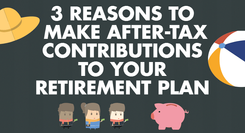Related Posts
Financial Institutions
15 States With the Best Financial Wellness
Last Update: December 5, 2022
Despite plenty of opportunities to learn from the past – the dot com bubble in 2000, the housing market bubble in 2007, the Great Recession – many Americans found themselves in trouble during the latest crisis due to COVID-19. According to a recent WalletHub study1, a large number of Americans do not have the necessary financial knowledge to make smart decisions, nor do they follow strong financial habits:
- Less than half have an emergency fund with at least three months of savings
- Only two out of five understand how much money they will need in retirement
- Slightly less than one-third invest their money to increase its growth potential
- Overall, Americans owe $1 trillion in credit card debt
- Less than half use a budget
That said, some states perform better than others on the financial wellness scale.
Defining Financial Wellness
Enrich defines financial wellness as having the knowledge, ability, and desire to make intelligent financial decisions, as well as having the capacity to live a happy life within one’s means. To measure financial wellness, the study looked at two main literacy scores:
Financial Knowledge and Education: This score included high school financial literacy, high school graduation rate, whether students are required to take personal finance in school, number of adults taking personal finance classes, the use of online financial services, and the percentage of adults with a Bachelor’s degree or higher.
Financial Planning and Habits: This score included things like credit score, spending within means, having an emergency fund, saving for children’s college education, saving for retirement, having a budget, using a checking and/or savings account, not borrowing money using high-interest-rate sources, paying more the minimum on credit cards, and comparing credit card terms before applying.
The Best States
One would think that the top 15 states in financial knowledge and education would also be the top 15 states in financial habits and planning. Although there is some overlap, there is no one-to-one correlation.
Here are the top 15 states for financial knowledge and education:
- New Hampshire
- Montana
- Maine
- Wyoming
- Wisconsin
- Nebraska
- Vermont
- Minnesota
- Colorado
- Alaska
- Iowa
- Washington
- Maryland
- Kansas
- New Jersey
Compare this to the top 15 states for financial planning and habits:
- Virginia
- Utah
- Nebraska
- Missouri
- North Carolina
- Ohio
- Iowa
- Texas
- Kentucky
- Colorado
- New Jersey
- Alabama
- Minnesota
- Washington
- North Dakota
Why The Difference?
As you can see, only Nebraska, Minnesota, Colorado, Iowa, Washington, and New Jersey score high on both scales. So, for example, why do those living in Virginia, whose financial literacy scores rank 39th, come in first place in financial habits?
Based on a Morningstar report, Understanding the Financial Impact of Behavioral Biases2, this discrepancy between knowledge and practice may have to do with financial biases.
A financial bias is a shortcut or rule of thumb that helps people make decisions. Unfortunately, some biases cause problems.
For example, if someone has a present bias, they give more weight to immediate rewards than to rewards that happen in the future. So, if presented with the opportunity to spend money now or save money to make it grow later, those with this bias are more likely to spend now.
Other biases include overconfidence in one’s knowledge and abilities, being afraid of risks, and making decisions on easy-to-find information rather than quality information.
People with these biases are less likely to form strong financial habits.
The study showed that the more financial biases a person had the more likely they were to have lower savings and retirement account balances, lower credit scores, and higher credit card debt. They were also more likely to spend beyond their means and forget to pay their bills on time.
Unfortunately, even those with strong financial literacy can be affected by these financial biases.
Enrich Can Help
One of the outcomes of the WalletHub survey was a debate on whether consumers should be tasked with educating themselves on financial matters or whether financial institutions should be tasked with educating consumers about using their products. However, the study clearly shows that information is not enough to change habits.
That’s where the Enrich financial wellness platform comes in. A financial institution offering Enrich does more than simply educate their customers because Enrich offers more than facts and financial definitions for the user to memorize. The holistic program includes:
- “Your Money Personality” assessment: Assesses financial behaviors, helping users understand their traits, strengths, and challenges about finances.
- Personalization: Provides users with a personalized action plan to help them gain knowledge and skills in weak areas.
- Gamification: Makes learning the materials and gaining skills entertaining, making it more likely that the user will continue to engage with the program.
With the Enrich program, users can gain a strong financial literacy background, learn how to reduce the effects of financial behavioral biases, gain strong financial habits, and make long-term changes.
Learn more about the Enrich Financial Wellness program for Financial Institutions
1 - https://wallethub.com/edu/most-and-least-financially-literate-states/3337
2 - https://www.morningstar.com/lp/impact-of-behavioral-biases
Featured Posts

Employers and Organizations
3 MIN
10 Simple Ways Benefits Managers Can Recession-Proof Their Employee Benefits Package

Employers and Organizations
3 MIN
3 Reasons to Make After-Tax Contributions to Your Retirement Plan

Employers and Organizations
4 MIN
Financial Information vs Employee Behavior Change: Which Is More Important for Your Company’s Financial Wellness Program?

Employers and Organizations
3 MIN
Does Your Employee Financial Wellness Program Take Mindset Into Consideration?
Related Posts

Employers and Organizations
4 MIN
How Comprehensive Financial Wellness Programs Prepare Employees For Uncertain Times

Employers and Organizations
4 MIN
Having More Money Does Not Mean Increased Financial Wellness

Employers and Organizations
3 MIN
Does Your Employee Financial Wellness Program Take Mindset Into Consideration?
